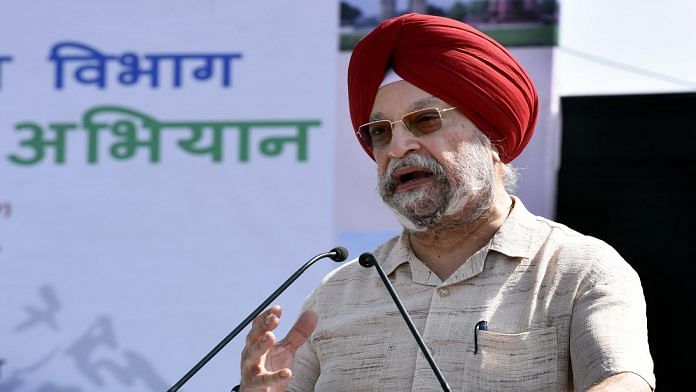Union minister Hardeep Singh Puri says overstaying is a problem and a law is in the works to solve it.
New Delhi: Union housing and urban affairs minister Hardeep Singh Puri says the Centre is considering making a law to help evict former MPs and officers who refuse to move out of the government accommodation given to them while in office.
The minister said overstaying was a problem, and could be tackled by persuasion as well as fines. He added that his ministry was working on a ‘public premises eviction’ act. “This will allow us to evict them by giving a public summary eviction notice for just three days.”
He said more than politicians, it was government officers who constituted the “real problem”. “There are 110 cases pending (against them) in court,” he added.
Funds crunch
The Bharatiya Janata Party-led National Democratic Alliance (NDA) government at the Centre completes four years in office next month. During its tenure, the Narendra Modi government has launched several high-profile schemes in pursuit of its development agenda. From Swachh Bharat to Smart Cities, the programmes have made headlines for their ambitious targets.
Talking of the Smart Cities Mission, Puri told ThePrint in an interview that it was the “world’s fastest project in terms of implementation”. “The results are already there to see. It is good to remember that we started only in 2015,” he said.
A total investment of Rs 1.9 lakh crore has been proposed by 90 cities under smart city plans, and, so far 77 contenders have established their special purpose vehicles to oversee the programme.
However, the former diplomat noted that a scarcity of funds was the main bottleneck for the Smart Cities mission, as it was for most government schemes. To address this problem, he added, the Centre had been turning to novel solutions.
“What we have done is to cut the coat according to the cloth. We have a good start,” he said.
He said the mission couldn’t be pulled off through funds from the public coffers alone. The only solution, he said, was public-private partnership. There was also a need to make municipal bodies financially self-sufficient by way of revenues raised through taxation and bonds, Puri added.
“I have no doubt money will come. I have a desire to float bonds. We will see about the terms of the bond. We are at it,” he added.
Bonds are essentially a form of debt to the issuer, who is obligated to eventually return the money with interest.
“And once they (municipal bodies) raise their own resources, you won’t have a situation where they don’t have resources to pay salaries to their employees,” he added.
Speaking about Swachh Bharat, Puri said the government was on track to meet goals set to curb open defecation. “The rate at which we are going, the target will be achieved,” he said. The target was to build 67 lakh toilets in urban areas and 48 lakh had been constructed, he added. They had set out to construct five lakh community toilets, of which 2.9 lakh are complete.
On India’s urbanisation
Of late, there have been several concerns about India’s rapid urbanisation. In 2016, an IndiaSpend review of scientific studies in five cities concluded that the country’s urban areas were turning into “heat islands”.
The development of cities as “expanses of concrete with closely-spaced high-storey buildings” and fewer trees, lakes and open spaces leads to higher heat retention, thus making cities hotter than nearby rural areas. It is also known to worsen pollution by increasing the demand for power to operate, for example, ACs.
However, Puri said urbanisation was a need and could not be reversed. India’s population, he said, had grown from 300 million in 1947 to over 1.25 billion now, and people were increasingly moving to cities for economic opportunities. “We have to deal with urbanisation… In fact, there is a need to build something like 700 -800 million square metres of urban space every year, both residential and commercial, between now and 2030,” he added.
On cleaning up real estate sector
While the government has introduced the Real Estate (Regulation) Act to protect buyers, several states had introduced tweaks in favour of builders.
Asked about the problems buyers faced on account of delayed real estate projects, among other issues, the minister said it was “a very difficult thing to clean up the sector”. However, he added, the process to do so was underway.
Puri said several steps taken by the government were helping bring a reform in the sector, citing as examples the goods and services tax, demonetisation, the insolvency code, infrastructure status to affordable housing (for benefits such as lower borrowing rates, tax concessions and increased flow of foreign and private capital) as well as RERA.






